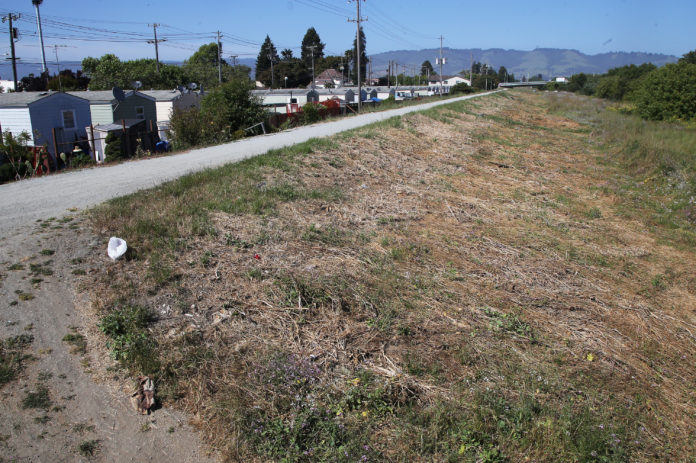
The Watsonville City Council on Tuesday expressed frustration at a new planned tiny village community for homeless people slated for the parking lot of Westview Presbyterian Church at 118 First St.
With the zoning approved on Sept. 20, Monterey County—the lead agency for the village—can now apply for a building permit.
The council made no decisions on the discussion-only item.
Known as “Recurso de Fuerza Village,” the project was created to give temporary shelter to homeless people that live along roughly three miles of the Pajaro River Levee in advance of the Pajaro River Flood Risk Management Project.
Officials also plan to provide services and help them find permanent housing.
The project is funded by an $8 million Encampment Resolution Funding grant awarded to Monterey County from the State of California.
For the first two years, it will be managed in collaboration with Monterey County, Santa Cruz County Health and Human Services and the City of Watsonville. It will be managed by the Community Action Board.
After two years, the County of Santa Cruz will assume oversight of the facility.
The village will have 26 single bedroom units, two double units and four units designed for handicapped people. It will also have four shared bathrooms, one staff bathroom, a dining room, a warming kitchen, a multipurpose room, two laundry rooms, an office, an intake area, a storage area, a pet exercise yard and a trash enclosure.
City and county officials—and members of the religious community—are hailing the project as a safe and humane way to help the homeless population.
Westview Presbyterian Church Pastor Dan Hoffman said he was surprised at the controversy that would ensue from the project.
Hoffman said he was inspired to allow the project on the property after serving breakfast to homeless people on the levee and hearing their stories.
“They just need a place to rest and get their bearing and then find housing or employment or whatever they need,” he said. “We’re called to love them through our faith communities.”
But neighbors and people living near the site have a different view.
Catalina Torres, who lives adjacent to the church site and has been a spokeswoman for the neighborhood, said her area is already besieged by vandalism and other crime, much of it from the homeless population that lives on the levee.
“We don’t have parks for our kids anymore,” she said. “We’re not against the shelter—we’re not. But we need to find a better place for it, and not our community where we’re already struggling a lot.”
Part of the issue facing the city is that state law allows “by right” permitting for projects like the village as long as they meet certain standards. This included offering supportive services and keeping detailed client records through the local Homeless Management Information System. They must also meet state code.
As such, the project was approved without city council approval. Further, the city cannot impose additional requirements, but can require safety codes such as fire, building and public works standards, said Principal Planner Matt Orbach.
“This level of discomfort that everybody feels right now, I think there is a little bit of growing pains,” he said. “I can tell you as a planner and as a resident of California, there is a lot of fear and anger and frustration over the loss of local control.”
Orbach pointed to a “Good Neighbor Protocol” from the County of Monterey that requires certain standards for the village and its residents.
But Councilman Casey Clark expressed doubt that those rules would be effective at keeping neighbors safe.
“Is it enforceable, or is it just a bunch of words on a piece of paper that is supposed to make everybody feel good until someone comes at them with a machete out of this project,” he asked. “Because that’s what happens in this neighborhood; this is what people are actually dealing with.”
Councilwoman Ari Parker questioned whether Santa Cruz County has a binding agreement to take over operation of the facility after two years.
“I am really concerned, and I was concerned at the beginning,” she said.
Santa Cruz County Housing for Health Director Robert Ratner said that agreement is outlined in a memorandum of understanding between Monterey and Santa Cruz County.
“We’re all committed to supporting this project on the county side,” Ratner said.
Councilwoman Kristal Salcedo asked whether Watsonville would be liable for issues that arise from the project.
“We are well aware this is a hot-button topic,”she said. “We are not able to vote as a council on this project, and we would appreciate some indemnity.”
City Attorney Samantha Zutler said the city is in discussions with the counties, including sharing the costs of legal fees.
Marta Buliach, who lives near the levee, said that both Watsonville and Santa Cruz County have long misled the public about their involvement in the project.
“This city, the counties and the church have never been transparent about the tiny village with the affected neighbors, despite the neighbors being victimized by homeless-related crime,” she said. “What makes a good neighbor policy? Transparency and honesty. This didn’t happen.”
In other action, the council unanimously approved a new ordinance that will require owners of mobile home parks who want to sell the land or develop it to obtain a special conditional use permit, and to submit a Relocation Impact Report.
They will also be required to help mobile home owners with the costs of relocation, in addition to expenses such as replacing blocks, skirting, siding, porches and decks, and with insurance to protect against damage, security deposits and first and the last month’s rent for a new mobile home park.













What they should do is make sure that the people on the PAJARO RIVER are able to obtain permanent housing with that 8 million not no tiny homes institutionalizing the people who doesn’t need to be victims of the city of Watsonville’s malfunctions and embezzlements. We need city leaders not city managers and Mayors who are going to be using the people that have less than to motivate their non-educational services that they tend to lack certificates and certifications for the proper jobs they are applying for. My name is monike tone and I approve this message
What they should do is make sure that the people on the PAJARO RIVER are able to obtain permanent housing with that 8 million not no tiny homes institutionalizing the people who doesn’t need to be victims of the city of Watsonville’s malfunctions and embezzlements. We need city leaders not city managers and Mayors who are going to be using the people that have less than to motivate their non-educational services that they tend to lack certificates and certifications for the proper jobs they are applying for. My name is monike tone and I approve this message.
What they should do is make sure that the people on the PAJARO RIVER are able to obtain permanent housing with that 8 million not no tiny homes institutionalizing the people who doesn’t need to be victims of the city of Watsonville’s malfunctions and embezzlements. We need city leaders not city managers and Mayors who are going to be using the people that have less than to motivate their non-educational services that they tend to lack certificates and certifications for the proper jobs they are applying for. My name is monike tone and I approve this message.Vote For Me city Manager
Who will be in charge if picking up the used needles and crack pipes?